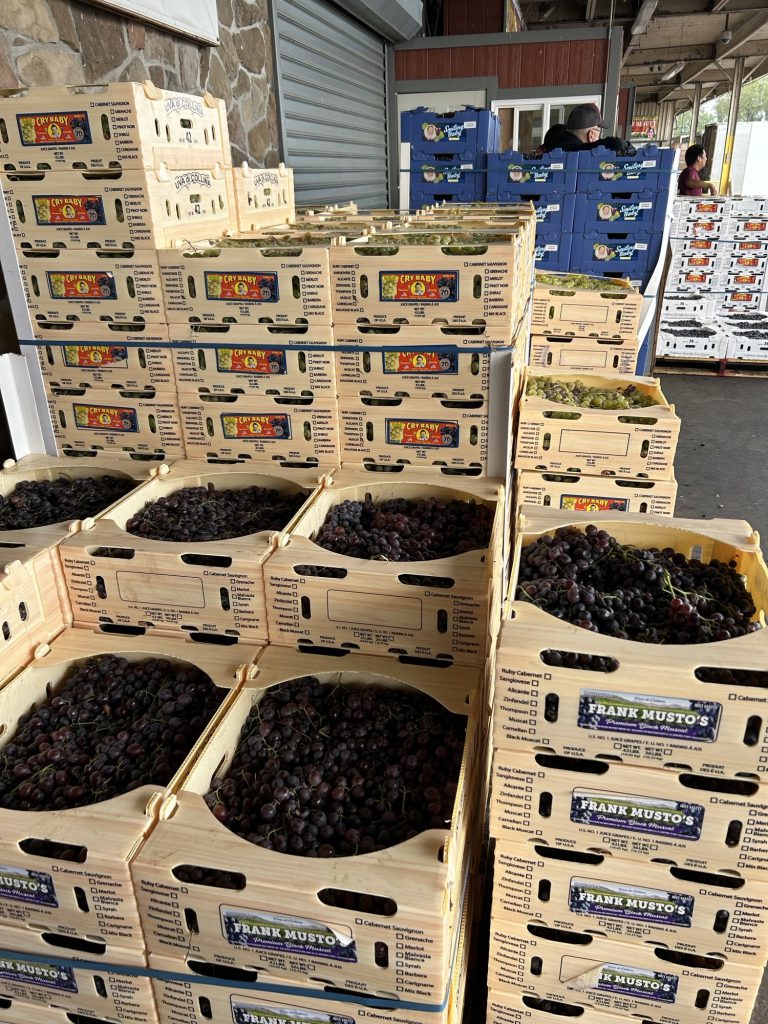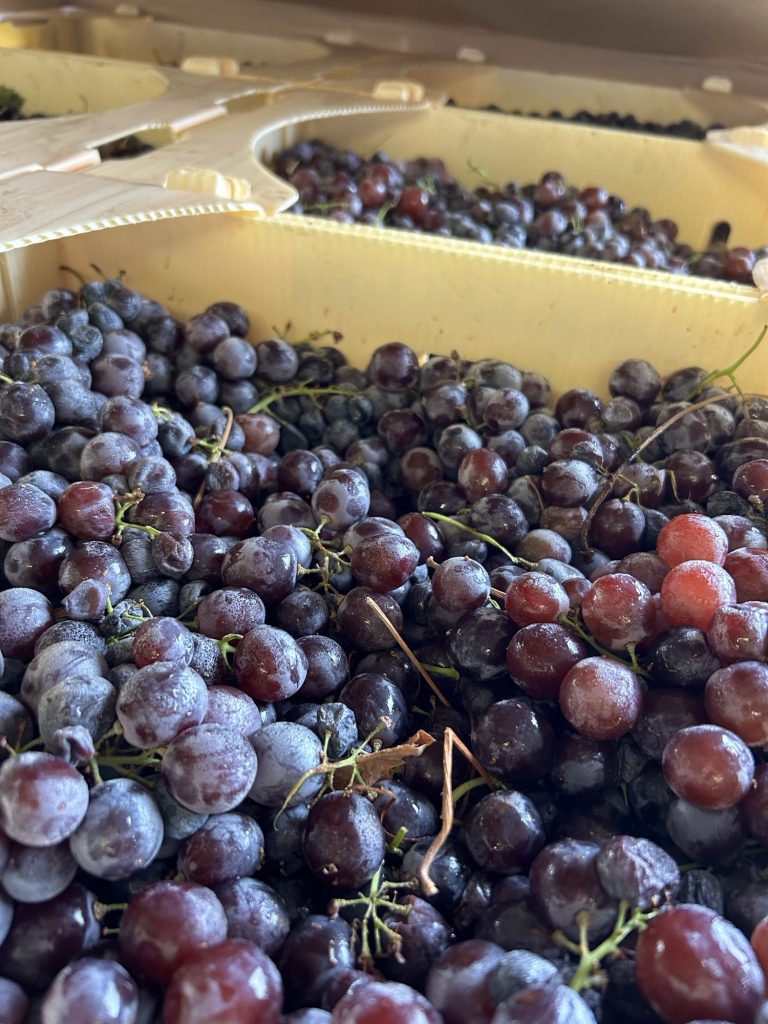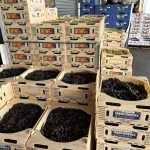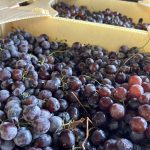Available for pick up this week (9/18-9/24)

Hello Winemakers,
I hope this message finds you well. We are thrilled to share some exciting news from our vineyard as we kick off this year’s grape harvest season.
The conditions this year have been wonderful, resulting in a crop of the finest grapes we’ve seen in a long time. We wanted to give you a sneak peek into what’s happening here at Musto Wine Grape this week.
Grape Varieties: Our vineyards boasts a variety of grape types, each with its unique characteristics. This year, we have seen exceptional growth and quality across the board. From the bold and robust reds to the crisp and refreshing whites, our grapes are thriving.
- Alicante, Cabernet, Chardonnay, Barbera, Black Muscat, Grenache, Merlot, Malvasia Bianca, Muscat, Old Vine Zinfandel, Petite Sirah, Petite Verdot, Pinot Noir, Sangiovese, Symphony, Syrah, Thompson Seedless, Touriga Nacional, Zinfandel, and Zinderella
Wine Juices: We have a great selection of wine juices with fresh pails arriving daily. We are fully stocked with our California juice pails. The Italian juices will start to arrive in the first week in October, along with the pre-order Fresco juices.
- Alicante, Barbera, Cabernet Sauvignon, Chianti, Grenache, Merlot, Mixed Black, Old Vine Zinfandel, Pinot Noir, Red Blend, Sangiovese, Zinfandel, Black Muscat (Rosé), Chardonnay, French Colombard, Pinot Grigio, and White Zinfandel (Rosé), and more!!
- Reminder: Fresco juices must be ordered by 9/25!
Harvest Updates: Everything is ripening beautifully, promising an outstanding flavor profile.
- Suisun Valley will not start harvesting until the end of this week. We should start to see their grapes arrive in late September / early October. *A late addition* to the harvest menu – we will have Pinot Noir from Suisun Valley!! There are only a few boxes available. Give us a call to secure your PN today!
- Washington State Pinot Noir is harvesting this week. We might see it as early as 9/25. The Washington Cabernet, Merlot, and Cabernet Franc should start harvest in the next 2 weeks.
Produce: Every year Stevie works hard to bring you seasonally delish produce. This week we will have more Olives, Figs, and Plums available for purchase. Please call ahead if you have your heart set on anything. We will have limited quantities.
- Olives arriving 9/21
- Figs arriving 9/22
- Plums here
Winemaker In Your Pocket: Musto Wine Grape and Frank Renladi put together online courses you can access from anywhere! Check out our online classes via our sister site WinemakingInstructions.com.
- Full Winemaking Course – Over 46 videos of content!
- Online Winemaker Bootcamp
- Freebies
Our team is hard at work, carefully monitoring the grapes’ progress. We can’t wait to start turning these exceptional grapes into the finest wines! Stay tuned for more updates as the harvest progresses. We’ll be sharing behind-the-scenes glimpses, tasting notes, and more exciting news in the weeks to come.
Thank you for being a part of our journey at Musto Wine Grape. We look forward to sharing the fruits of this year’s labor with you and raising a glass together to celebrate the extraordinary flavors of our grapes.
Cheers to a bountiful harvest!
Christina & The Musto Crush Crew
Musto Wine Grape Co. / WinemakingInstructions.com
www.juicegrape.com / 877-812-1137 / cmusto@juicegrape.com
🍇🍷 Exciting News! The Black Muscat Wine Grapes Have Arrived! 🍇🍷

The dock is buzzing with excitement as we welcome the arrival of our beautiful Black Muscat wine grapes, ripened to perfection under the warm sun and nurtured with care.
🍇 Black Muscat
When it comes to grapes, we often think of the popular varieties like Cabernet Sauvignon, Merlot, or Zinfandel. However, tucked away in the world of vineyards is a gem that’s lesser-known but equally delightful – Black Muscat grapes. These grapes are a true delicacy, offering a unique combination of intense flavor, striking appearance, and a rich history. Black Muscat makes a fantastic sweet rosé, light red wine, and is a great base for Raki. In this post, we’ll dive into the fascinating world of Black Muscat grapes and explore what makes them so special.
🌞 A Brief History
Black Muscat grapes have their origins in the Mediterranean and are closely related to the Muscat family of grapes, known for their aromatic and sweet qualities. These grapes have a long and storied history, dating back thousands of years to ancient times when they were cultivated for wine production and used for medicinal purposes.
🍷 Flavor Profile
Black Muscat grapes are known for their stunning appearance. They are a large to medium-sized, round or oval in shape, and have a deep black or purple-black skin. When you hold a bunch of Black Muscat grapes in your hand, you can’t help but be captivated by their dark, enchanting beauty. The real magic of Black Muscat grapes lies in their flavor. These grapes are renowned for their intense aromatics and sweetness.
IN STOCK FOR THIS WEEKEND:
- Grapes: Grenache Noir, Grenache Blanc, Black Muscat, Muscat, Pinot Noir, Tempranillo, Teroldego, Barbera, Cabernet, Merlot, Zinfandel, Old Vine Zinfandel, Mettler Pinot Grigio, Mettler Grenache, Alicante, and Thompson Seedless
- Juices: Cabernet Sauvignon, Merlot, Zinfandel, Grenache, Black Muscat, Mixed Black, Petite Sirah, Pinot Noir, Ruby Cabernet, Syrah, Chardonnay, Muscat, Pinot Grigio, Riesling, Sauvignon Blanc, Thompson Seedless, Viognier, and White Zinfandel
- Always call ahead to make sure you have the most up to date stock information!
Raki & Black Muscat:
Additionally, to wine – Black Muscat is a great grape to use for the drink Raki. Raki is the National drink of Turkey. It is also a popular drink through the Baltic regions and in Albania.
Raki is a traditional alcoholic beverage that is popular in several countries, especially in the Mediterranean region, including Turkey, Greece, Albania, and parts of the Balkans. It is an anise-flavored spirit with a strong, distinctive taste. The production process of raki typically involves several steps:
- Fermentation of Grapes or Other Fruits: Raki can be made from a variety of fruits, with grapes being the most common choice. Black Muscat has gained in popularity over the years to be the preferred grape to use. The first step is to crush and juice the fruit, which is then fermented. Yeast is often added to initiate the fermentation process, converting the sugars in the fruit into alcohol. This initial fermentation usually takes a few weeks.
- Distillation: After fermentation, the liquid is distilled to increase its alcohol content. The traditional method involves using a special copper pot still called a “degirmen” in Turkey or “rakia” in Greece. The fermented fruit mash is heated, and the alcohol vapor is collected and condensed to produce a high-proof spirit. The distillation process is usually repeated to ensure a higher alcohol concentration.
- Anise Flavoring: Anise seeds or aniseed are an essential ingredient in raki production. These seeds are typically crushed or ground, and the resulting powder is added to the distilled alcohol. This gives raki its characteristic licorice-like flavor and cloudy appearance when mixed with water. The anise-flavored alcohol is allowed to rest for a period, allowing the flavors to meld.
- Dilution: Raki is typically consumed by diluting it with water, which also causes it to turn cloudy due to the anise oils becoming less soluble. The ratio of water to raki can vary according to personal preference but is often around 1:1 or 2:1 (water to raki).
- Bottling and Aging: Some raki may be aged in wooden barrels for a short period to mellow its flavors, although this is less common than with other spirits like whiskey or brandy. Once the aging process is complete, the raki is typically filtered and then bottled for sale.
It’s important to note that the production methods and ingredients may vary from one region to another, and there may be slight variations in the production process. Also, the alcoholic content of raki can vary, but it is generally around 40-45% alcohol by volume.
Enjoyed primarily as an aperitif or as an accompaniment to meals, raki has a strong cultural significance in the countries where it is popular, often being consumed during social gatherings and special occasions.
Black Muscat & Rosé:
On the nose there is passion fruit, guava, sweet strawberry, sweet cherry, and papaya. The aromatics continue through the palate with a touch of crisp acidity. As a dry wine this light bodied Rose is full of complexity and flavor. If you’re more of a sweet winemaker, adding about 1-2% Residual sugar to this wine would make for a very aromatic and balanced sweet wine.
Black Muscat Winemaking Recipe:
- Crush the Black Muscat into vat
- Add Potassium Meta to kill native yeast, let sit for 12 hours
- Add Cinn Free, stir must, let sit for another 12 hours
- Press juice after 24 hours on the skins
- Add Booster Blanc and Opti White (dilute in spring water, mix like pancake mix, dump into must, mix up)
- Pitch yeast after 24 hrs on skins, make sure juice is at 65 degrees. If not let it warm up. Use VIN13 yeast.
- Next Day: Add Fermaid O
- Monitor Brix levels daily
- At 1/3 of a drop in Brix (10-8 Brix) add Fermaid K
Please Note:
The color might be light. It darkened up over time. And if it doesn’t darken up enough to your liking, I have some “pixie dust” that will help with the color during the aging process. Also, after fermentation I added Noblesse at my first racking. This is because I thought the acid was a little high and it helped soften the mouthfeel. Every year is different, so you might not need to do this. Taste it after fermentation and then decide.
If you are interested in making Black Muscat wine and having any questions please feel free to reach out to our winemaking professionals via phone or email – 877-812-1137 or sales@juicegrape.com.
Don’t forget about our Winemaking Classes…
Hands-On Winemaking: Back by popular demand is our Winemaker Bootcamp. The September Class will start Saturday September 16th, 2023 at 9:00AM – 12:00PM (runs for 5 weeks). The October Class will start on Saturday October 21st, 2023 at 9:00AM – 12:00PM (runs for 5 weeks). Make sure to sign up via the website or email cmusto@juicegrape.com if you are interested. There is only 1 space left in the September class and only 2 spaces left in the October class!
Winemaker In Your Pocket: Musto Wine Grape and Frank Renladi put together online courses you can access from anywhere! Check out our online classes via our sister site WinemakingInstructions.com.
We look forward to seeing you at pick up this season! 😊
Cheers!
Christina & The Musto Crush Crew
Musto Wine Grape Co. / WinemakingInstructions.com








Recent Comments